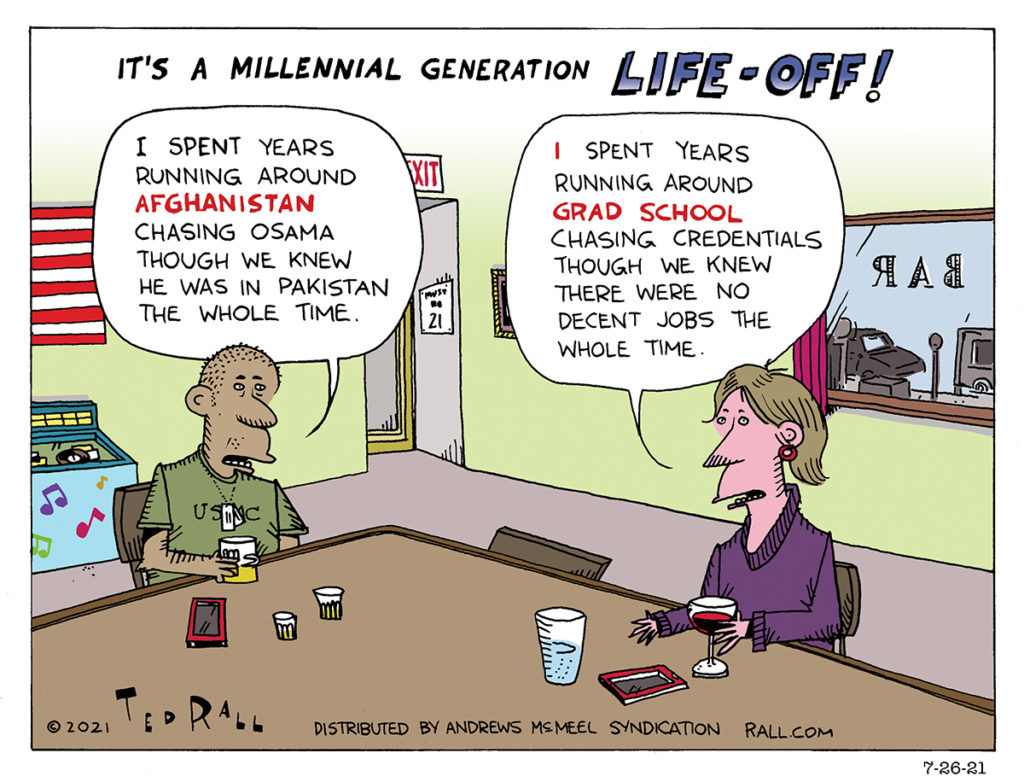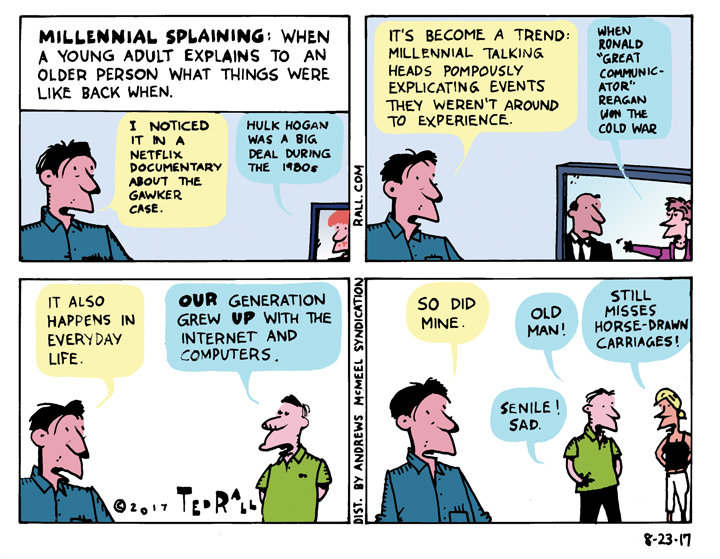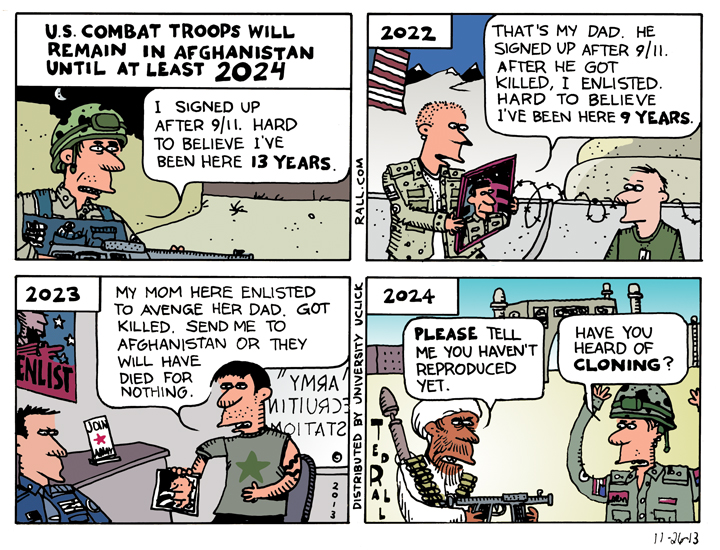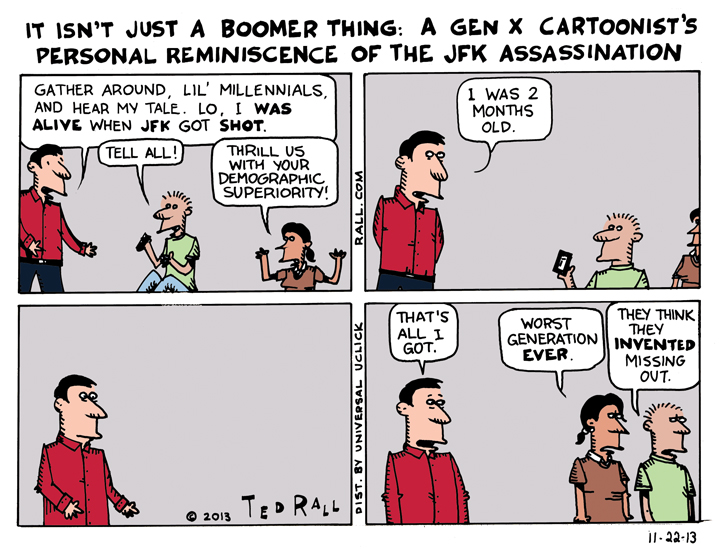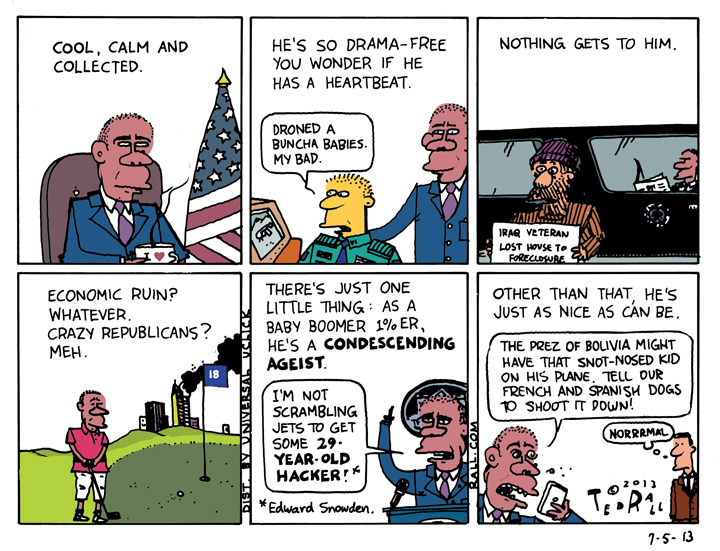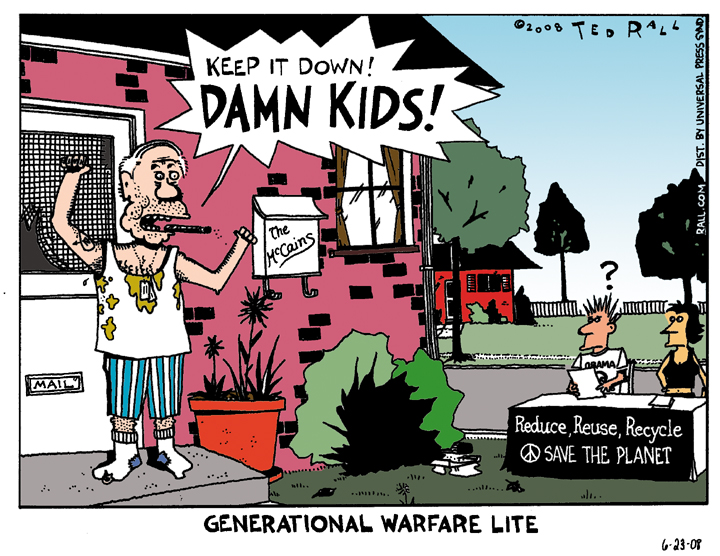Trillions of dollars have been spent. Thousands of American soldiers have been killed. Yet the United States is right back where it started in Afghanistan 20 years ago, with the Taliban advancing so rapidly that military experts believe they will soon control the entire country again. Some veterans are asking aloud, was the war worth the cost? Clearly not. The war was a mistake from day one. After all, Osama bin Laden was in Pakistan the entire time, not Afghanistan. And the 9/11 plot was hatched in Pakistan and probably funded by Saudi Arabia. We never should have been there.
The Disappearing of Generation X
Generation X — Americans born between 1961 and 1974 — have been “disappeared“ from the media like a fallen-out-of-favor Soviet apparatchik airbrushed out of a picture from atop Lenin’s tomb.
Gen X was an important facet of the start of my career. I used to write and draw a lot about Gen X. I authored a seminal Gen X manifesto, Revenge of the Latchkey Kids (1996). For a while there, it seemed like we were going to take our rightful place as the third-biggest generational cohort—not the biggest by any means but at least…extant.
Now the Internet is talking about a CBS News infographic in which zero Americans were apparently born between Boomers and the Millennials. CBS listed four generations:
“The Silent Generation: Born 1928-1945 (73-90 years old)”
“Baby Boomers: Born 1946-1964 (54-72 years old)”
“Millennials: Born 1981-1996 (23-37 years old)”
“Post-Millennials: Born 1997-present (0-21 years old)”
(The so-called “cusp kids” born between 1961 and 1964 are demographically Boomers because of high birth years but culturally Gen X because they share cultural touchstones with younger Americans.)
That’s right, Gen Xers: to CBS News, you’re less real and alive and important than someone who is zero years old. So much for Gen X culture—“Reality Bites,” “Slacker,” “Singles,” “Clerks,” anything by Quentin Tarantino or Richard Linklater, pretty much all indie rock ever, alternative cartooning, oh and the Douglas Coupland book called, um, “Generation X.” To CBS, that stuff matters less than the pee and poo and puke and drool emanating from a zero year old.
The disappearing of Gen X is a genuine widespread trend. A New York Times op-ed by David Leonhardt discusses “the fleecing of the Millennials” by Boomers and attributes not only declining living standards but also the “burnout“ slur as being brand new to Millennials while in fact both of these characterized Gen X first, decades earlier.
When you read it, it’s downright bizarre that the phrase “Generation X” never appears anywhere. Online commenters were baffled.
These days all the conversation in the media is about the supposed stylistic differences and economic clashes between the Baby Boom and Millennial generations. Generation X is ignored; we don’t even get caught in the crossfire. In a recent SNL skit called “Millennial Millions,“ Millennials are offered prizes like free healthcare if they manage to shut up for 30 seconds while a Boomer talks trash about them. The game show host says, “I’m Gen X. I just sit on the sidelines and watch the world burn.” I’m Gen X so I laughed.
Being deemed irrelevant is bad enough. What will it do to our already close-to-nonexistent self esteem to realize that everyone else in the country doesn’t even know we’re alive?
A Philadelphia Magazine article—that came out last year, for God’s sake—feels like the last nail in our once-notable demographic coffin. “Whatever Happened to Generation X?” asks the headline. What happened, apparently, is that we got relegated to “whatever-happened-to” pieces in friggin’ Philadelphia magazine. (It’s actually a good piece, and you should read it, but you won’t because Gen Xers don’t read about themselves and Millennials and Boomers only care about themselves.)
Forbes explains, I think credibly, that Gen X is far more influential than anyone thinks, though this particular line is unintentionally hilarious: “What they lack in numbers — just 66 million to boomers’ 75 million — they make up with a stellar engine that has quietly been revving over the years.”
“Stellar engine”? That’s the name of my new 1980s retro-synth band. We’re influenced by Soft Cell. Also, “just”? 66 million is “just”? Even compared to 75 million?
Anyway, Anna Sofia Martin writes, “a whopping 55% of startup founders are part of Gen X.” So much for slacking. Anyway, who can afford it? We Gen Xers, not Millennials, were the first generation to get crushed by student loan debt. Even so, we have “31% of U.S. income, but just 25% of the population.” So latchkey kids really are having a sort of revenge.
“Masters of self-deprecation,” Martin calls us. She’s right. So, when Millennials and Baby Boomers insist us on pretending that 66 million people simply don’t exist we’re, like…
what-ever.
(Ted Rall, the cartoonist, columnist and graphic novelist, is the author of “Francis: The People’s Pope.” You can support Ted’s hard-hitting political cartoons and columns and see his work first by sponsoring his work on Patreon.)
SYNDICATED COLUMN: Never Mind Millennial Apathy, Here’s Generation Z
 Like many other Americans this week, I have been impressed with the poise, passion and guts of the Florida teenagers who survived the latest big school shooting, as well as that of their student allies in other cities who walked out of class, took to the streets and/or confronted government officials to demand that they take meaningful action to reduce gun violence. As we mark a series of big 50th anniversaries of the cluster of dramatic events that took place in 1968, one wonders: does this augur a return to the street-level militancy of that tumultuous year?
Like many other Americans this week, I have been impressed with the poise, passion and guts of the Florida teenagers who survived the latest big school shooting, as well as that of their student allies in other cities who walked out of class, took to the streets and/or confronted government officials to demand that they take meaningful action to reduce gun violence. As we mark a series of big 50th anniversaries of the cluster of dramatic events that took place in 1968, one wonders: does this augur a return to the street-level militancy of that tumultuous year?
The Sixties were the Decade of Youth, an era that ended when Baby Boomers aged out of flowers and free love into jobs and suburbs. Adulthood makes everyone put away childish things — not that agitating against war and fighting for equal rights is kid stuff — and to be fair to the Boomers, they were driven off the protest lines by hails of government bullets at places like Kent State University. For my money the Sixties died in 1972, the first year 18-to-20 year-olds got the vote and either didn’t show up or used their new franchise to reelect Richard Nixon.
Compared to the heyday of the anti-Vietnam War movement, when every little town in America had protests pretty much every day (even just sad little clusters of hippies huddling under umbrellas in the traffic median) for years on end, the activist left has been on hiatus ever since. There were Solidarity Day in 1981 and the Battle of Seattle in 1999 and marches against the Iraq War in 2003 and Occupy Wall Street in 2011 and, recently, a pair of anti-Trump Women’s Marches. But those events were intermittent, exceptional, spasmodic. Generation X — discriminated against, passed over for good jobs, marginalized by culture and media — was too busy working multiple crappy jobs to organize, protest and effect change.
If anything, Millennials have proven even more politically apathetic — or perhaps it would be fairer to say hapless. More than other generations, Millennials believe volunteerism and growing local businesses can change society. The issue they care most about is transparency. There’s nothing wrong with helping out with a community garden, buying organic food or demanding that charities show where donations go — but what about climate change or the fact that capitalism is inherently an engine of inequality?
The last four decades have been characterized by somnolence; that’s why we now call people who are different than that, who actually pay attention and care about the state of the world, “woke.”
Which is the good thing about Trump: he woke us. President Hillary Clinton wouldn’t have provoked nearly as much activism against sexism, misogyny and gun laws that allow 18-year-olds to buy AR-15s.
What we need now is a post-Millennial generation of activist youth — because revolutions require passion and rage, i.e. lots of energy.
The post-Millennial generation, now teenagers and college-age, are so freshly-minted that the best name demographers have assigned them is Generation Z — a riff on their parents the Xers. (Millennials are Gen Y.) So far their no-nonsense “since no one else is fixing the problem we’ll take care of it ourselves” fits neatly into the Strauss-Howe generational theory model. As Gen Z heads into their twenties in the 2020s, the “Generations” authors predicted they’ll be challenged to respond to some major American crisis. If the young Floridians who stood up to establishmentarian right-wingers Senator Marco Rubio and President Trump are any indication, they’ve just begun to fight — and we’ll be in good hands.
(Ted Rall (Twitter: @tedrall) is co-author, with Harmon Leon, of “Meet the Deplorables: Infiltrating Trump America,” an inside look at the American far right, out now. You can support Ted’s hard-hitting political cartoons and columns and see his work first by sponsoring his work on Patreon.)
SYNDICATED COLUMN: Are Millennials the Most Ageist Generation Ever?

Ever notice how those who complain about being victims are themselves at least as likely to be perpetrators of the same offense? Examples that come to mind for me include the United States and Israel, two countries that portray themselves as targets of terrorism while carrying out wars of aggression whose death tolls far exceed their own losses. You’ll no doubt think of your own examples.
We’re seeing this projection at work with Millennial ageism. The Millennial generation is the most ageist in memory, yet the online media outlets they dominate discuss a problem that, if it really exists, pales in comparison: ageism against Millennials. But, like American presidents’ assertions that the United States has to protect itself against the world when, if anything, it’s really the world that needs to protect itself against the United States, it’s a joke.
Millennials’ status as members of the biggest generation in history – numbering more than 83 million, they have officially beaten the Baby Boomers – ensures that they will have a lot of power over American politics and the workplace, especially as they get older.
Which, if current experience serves to predict the future, they will abuse.
As I have written, ageism – the old-fashioned kind, by the young against the old – is endemic to Silicon Valley, the highest profile business sector controlled by people in their 20s and low 30s. Moreover, it’s normative: everyone thinks it’s OK. So OK do they think it is that national business magazines even publish articles saying it’s “smart” not to hire older Americans because they’re “dumber.”
I call it the old-fashioned kind of ageism because young-picking-on-old discrimination hasn’t been a thing since the “youth culture” of the 1960s and 1970s. Back in their hippie days, Baby Boomers in their 20s were so mean to their elders that they even made a movie whose plot involved putting people over 30 into concentration camps. As they got older, Baby Boomers flipped the switch, deploying their power as employers to discriminate against Generation Xers. Now that the Boomers are finally fading into the demographic mists, their Millennial children are beginning to repeat that half-century-old pattern, marginalizing and refusing to hire Gen Xers.
Ah, the great psycho of life.
While thinking about and researching this essay, I turned my critical eye to myself and my Gen X contemporaries. When we were in our 20s, didn’t we look down on older people? When we got a chance to hire and fire, didn’t we discriminate against those we viewed as boring and out of touch?
Not really.
Sure, we had more in common with members of our own age cohort than those older than us. But we didn’t look down on older folks…though many of them made fun of us (if they noticed us at all) and would rather let a job go unfilled than hire us.
I remember, for example, working as a staff writer for P.O.V. magazine. Almost all of us were in our 20s and 30s — not because management rejected older writers, but because older writers already had jobs elsewhere. But when editor Randall Lane brought on legendary sportwriter-barfly Bert Sugar as a columnist, not only did no one hold his age against him – he was pushing 60 and looked closer to 80 – everyone thought it was cool to add him to the team. Not just because he was “old school,” which we all admired, or despite his age, but because we appreciated the value that comes with experience. He had stuff to teach us; we wanted to learn, and hoped that some of that glory might rub off on us.
Compare that to the unceremonious departure of Mark “Copyranter” Duffy, 53, from BuzzFeed. Dude was the smartest man in the office; they fired him for being old.
I’ve never been into her music, but the cruel reception of Millennial-dominated media outlets to Madonna’s insistence on continuing to use sex to market herself at age 56 has me admiring her spunk (and, actually, finding her physically hotter than she was back in the 1980s). Also, I have to contrast the viciousness to the way that we Gen Xers treated older pop and musical figures at the same age.
As a record reviewer in my late 20s and early 30s, I can’t recall a single instance of an older rock or pop musician or group being dissed simply because he or she was old. If you sucked, you sucked. If you were good, you were good. If anything, our default mode was to tend to respect anyone who had stuck around for a while. We didn’t exactly respect our elders — as Gen Xers, we didn’t respect anyone, not even ourselves – but we didn’t disrespect them either. For us, it made perfect sense that punk rockers like The Clash admired old glam guys like Ian Hunter of Mott the Hoople.
That “rather die before I get old” crap was from the 1960s, not us.
The tendency of Millennials to denigrate their Gen X and Boomer elders is probably hardwired into the demographic reality of belonging to a big, dominant generation. One of the ways you feel good about yourselves is by picking on smaller, weaker groups. No matter what I or anyone else writes, even if every Millennial in the world reads it, there’s virtually no chance it will reduce their ageist tendencies.
Still, it’s sad. I think about my former literary agent and friend Toni Mendez, who died 12 years ago —at work — at the age of 95. She was more vibrant and interesting and outrageous and intelligent than a thousand typical 25-year-olds combined, and I still miss her terribly. Those 30-year-old gatekeepers in Silicon Valley and elsewhere who think that everyone over 35 has nothing to contribute are screwing themselves too, and leaving money on the table.
(Ted Rall, syndicated writer and the cartoonist for The Los Angeles Times, is the author of the upcoming book “Snowden,” the first biography of NSA whistleblower Edward J. Snowden. It is in graphic novel form. You can subscribe to Ted Rall at Beacon.)
COPYRIGHT 2015 TED RALL, DISTRIBUTED BY CREATORS.COM
SYNDICATED COLUMN: Rand Paul Proves That the American Political System is Broken

I have been arguing for years that the American political system is broken. Not in the way that everyone else says it is – the Democrats and Republicans unable to compromise or get anything done. Given what happens when the two major parties cooperate – “free trade” agreements that send American jobs overseas and cut wages for those that remain, wars we have no chance of winning, and tax “reform” that only benefits the extremely wealthy and the corporations they control – we could use a lot more Washington gridlock.
The best indication that the United States government is no longer a viable entity, and so beyond reform that we need to start from scratch, is the fact that the best and the brightest no longer aspire to a career in politics or governmental inspiration. It’s not just anecdotal; polls and studies show that the millennial generation, like the generation Xers before them, care deeply about the nation’s and the world’s problems but don’t think that it’s possible to solve them through the political system, refuse to sacrifice their personal privacy in a campaign, and are disgusted by the requirement of raising millions of dollars in order to run.
Despite the obstacles, every now and then – like that one tadpole out of a thousand that manages to evade the snapping jaws of hungry fish – someone interesting and intelligent decides to enter public life. Unfortunately, these poor souls must present themselves as boring and stupid in order to do so – and shred every last ounce of integrity they had before they entered the political process.
If there is a better case for this political system being over and done, I don’t know what it is.
Current case study: Rand Paul.
The senator from Kentucky has been a principled voice of resistance to the Obama administration’s most egregious violations of privacy and civil liberties. He has relentlessly opposed the National Security Agency’s wholesale collection of Americans’ personal communications and digital data, filibustered to protest the attorney general’s refusal to rule out using drones to kill American citizens on American soil, and followed his libertarian father’s tradition of non-interventionism by opposing the post-9/11 endless “war on terror.”
In many respects Paul, a Republican, has been more liberal – and certainly more vocal – than the most left-leaning members of the Democratic Party.
Now, however, he has officially declared that he is running for president next year. And so the usual coalition of GOP officials, Washington Beltway pundits, and no doubt his campaign advisers are telling him that he must abandon the interesting, intelligent and true-to-the-Constitution stances that got him noticed in the first place.
Gotta become “electable,” you see.
In just one week as a presidential candidate, he has backed away from his 2007 statement – which happened to have the virtue of being correct – that Iran did not represent a military threat to the United States. To be a Republican these days, you have to be against everything Obama does, and he just finished negotiating a deal to normalize relations with Iran.
Paul made some major efforts to reach out to African-Americans over the last few years – rare for a Republican – but there are early signs that his unwillingness to call out the racist “dog whistles” of his Tea Party-besotted opponents will neutralize his previous expressions of sympathy for black victims of police profiling and brutality.
He even flip-flopped on drones. “If someone comes out of a liquor store with a weapon and $50 in cash, I don’t care if a drone kills him or a policeman kills him,” he said recently.
What’s next: selling us out on the NSA? Apparently maybe.
I am tempted to argue that Paul is wrong, and that he would be better off personally as well as politically sticking to his guns. After all, he has, or at least has had, these popular positions all to himself. Why follow the lead of Al Gore, who foolishly decided not to emphasize his credibility as an environmentalist in 2000?
Be that as it may, let’s focus on the big takeaway: the perception among the political class that, to be electable, you have to adjust your positions to conform to the banal, the uninspired, the illegal, with total disregard for the will or the greater good of the American people.
Broken.
(Ted Rall, syndicated writer and the cartoonist for The Los Angeles Times, is the author of the new critically-acclaimed book “After We Kill You, We Will Welcome You Back As Honored Guests: Unembedded in Afghanistan.” Subscribe to Ted Rall at Beacon.)
COPYRIGHT 2015 TED RALL, DISTRIBUTED BY CREATORS.COM

